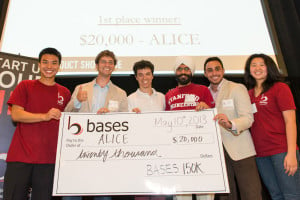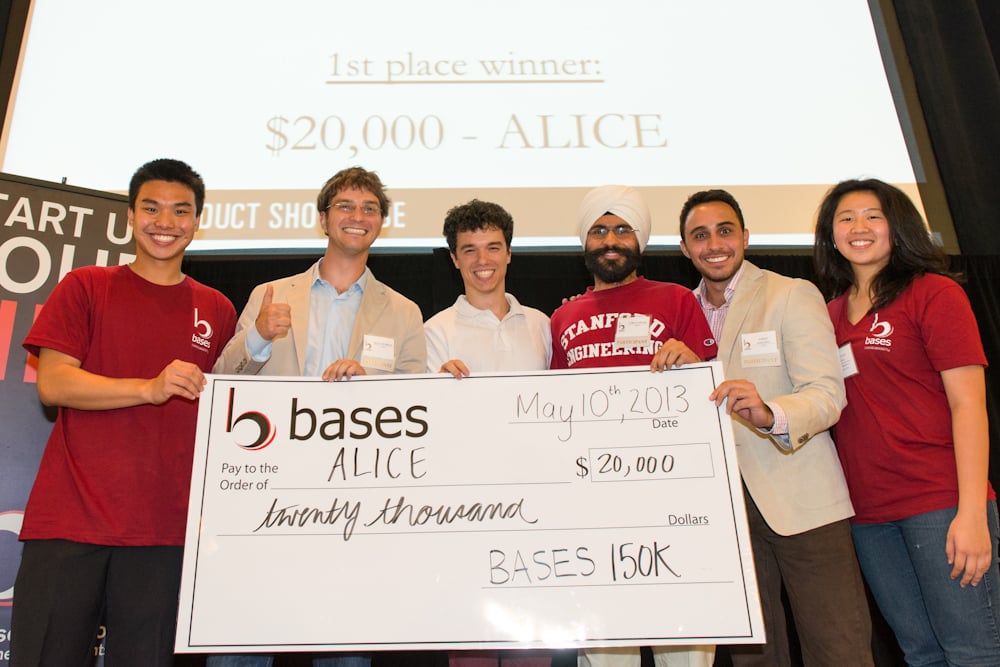The Business Association of Stanford Entrepreneurial Students (BASES) awarded $150,000 to 14 startups on Friday in the finale of a multi-round entrepreneurial competition that began in January.

Teams entered the group’s 150K Challenge in one of three categories—the Social Entrepreneurship Challenge (Social E-Challenge), the Entrepreneurship Challenge (E-Challenge) and the Product Showcase. BASES received 96 entries for the E-Challenge, 41 entries for the Social E-Challenge and 81 entries for the Product Showcase.
Product Showcase
The Product Showcase competition was open only to Stanford-affiliated entrepreneurs, and participants applied to the program with products they had already created. The BASES team selected a group of finalists to demonstrate their prototypes at the finale.
“It’s like a science fair on steroids,” said Zineb Laraki ’12 M.S. ’13, vice president of external relations at BASES. “It is very product- and idea-driven.”
More than 50 companies presented their products at the Product Showcase, including Auralyze, an acoustic modeling firm founded by Charles Mbatia ’13, Andrew Tener ’13, Konstantine Buhler ’14 and Jonathan Abel M.S. ’84 Ph.D. ’89, a consulting professor of music.
Auralyze’s co-founders voiced their appreciation for the opportunity provided by the showcase to reach a broad network of potential investors.
“I think the BASES program is fantastic— they have given Auralyze a way to show our technology to a large group of investors and we are already rapidly gaining interest,” Buhler said.
The top Product Showcase prize and $20,000 went to ALICE, an artificial intelligence product that reduces the amount of time necessary to schedule a construction project. Stratio came in second place, winning $15,000, and Flamestower took third and the $10,000 prize. MedAble and Refresh tied for fourth place, with each receiving $2,500.
E-Challenges
The Social Entrepreneurship Challenge showcased novel ideas in social innovation and technology, while the Entrepreneurship Challenge featured companies with products in a wider range of markets.
According to Laraki, both E-Challenges were business model competitions. Entrants went through several rounds of judging and mentorship before six companies from the Social E-Challenge and nine companies from the E-Challenge were selected as finalists.
In the Social E-Challenge, Anjna Patient Education, a non-profit focused on informing patients about their health conditions using text messaging and voice technology, received the top prize and $25,000. Adapt Air won $15,000 as runner-up, and Flamestower and Vynca won $5,000 apiece in third place.
Vineet Singal ’12, co-founder of Anjna Patient Education, said that the competition provided valuable experience in presenting to and networking with potential investors.
“I think that for me it was a great experience to have a public presentation, because it is important for us to be able to tailor one pitch to different audiences,” Singal reflected.
In the E-Challenge, AWAIR took home the top prize of $25,000, with Resido Medical winning $12,500 for second place. Third place and $7,500 went to CinderBio, and ChemoFilter and ALICE tied for fourth place, receiving $2,500 each.
Matthew Goodyear ’12 M.S. ’14, co-president of BASES, described this year’s finalists as especially talented and noted that the competition had attracted more medical, healthcare and information technology companies than in previous years.
“They seem to get better every year,” he said. “I think they’re all good—they had to get through three rounds.”
Keynote speech
At the end of the event, attendees heard a speech from keynote speaker Steven Vassallo M.S. ’95 M.B.A. ’04. A general partner at Foundation Capital, Vassallo encouraged student entrepreneurs to clearly identify the problem they are trying to solve with their companies.
Vassallo also discussed the changes occurring in the startup world, and mentioned a “troubling pattern” he has recently seen in the Stanford graduates he recruits and hires.
“Too many folks are not willing to take the less grand responsibilities,” he said. “Too many people want to be CEOs before they slay their first dragon. This prevents you from standing out, from being the hero who slays the dragon. You’ve got plenty of time to be the CEO. Now is the time to be the heroic young dragon slayer.”
